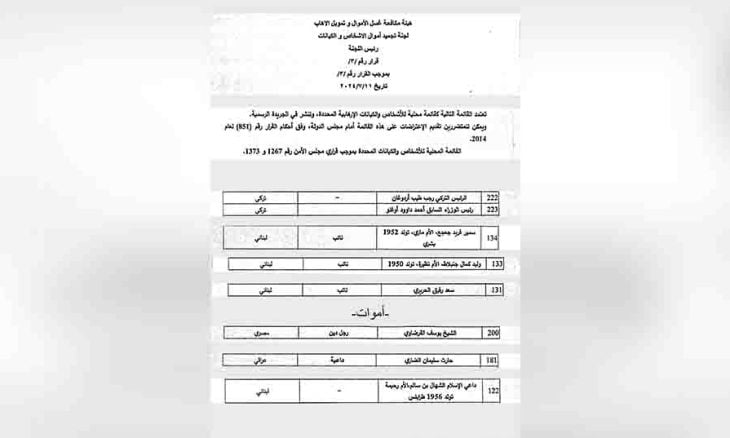Al-Quds Al-Arabi has obtained a new list issued by the Syrian regime’s Anti-Money Laundering
and Counter-Terrorism Financing Authority. The decision, issued by the Chairman of the Committee for Freezing Assets of Individuals and Entities, is numbered 3 and dated July 11, 2024. It is an update to the list of individuals and entities accused of money laundering and supporting domestic terrorism.
The list includes prominent politicians, political parties, international entities, as well as Arab and foreign clerics and parliamentarians. Following the recent update, the number of individuals accused of financing terrorism and money laundering has reached 597, and the number of entities stands at 105, although the actual figure is 127 organizations, considering that all Turkish associations classified as supporting terrorism are grouped under one category, totaling 24 organizations.
The list features one head of state, Turkish President Recep Tayyip Erdogan, and two former prime ministers, Ahmet Davutoglu, former Turkish Prime Minister and Foreign Minister, and Saad Hariri, former Lebanese Prime Minister and head of the Future Movement. Other notable figures include Walid Jumblatt, leader of the Progressive Socialist Party, and Samir Geagea, leader of the Lebanese Forces.
The individuals listed hail from various Arab and foreign nationalities, including Bahrain, Saudi Arabia, Kuwait, UAE, Qatar, Egypt, Lebanon, Algeria, Tunisia, Morocco, Iraq, Mauritania, Libya, Palestine, Sudan, Pakistan, Indonesia, Senegal, Turkey, Eritrea, Nigeria, France, Sri Lanka, Thailand, Kenya, Nepal, Benin, Albania, Bosnia, Spain, Germany, and the USA.
From Bahrain, the list includes seven individuals, among them MPs Abdul Halim Murad, head of the Islamic Asala Association, and Adel Abdul Rahman Al-Maawada, and former MP Hamad Al-Muhannadi, along with clerics Shouqi Abdul Rahman Al-Munai and Adel Ali Al-Sheikh.
Saudi citizens rank second after Syrians on the list, with 68 individuals, including businessmen, traders, officers, university professors, lawyers, and doctors.
The list features 32 Kuwaitis, including current and former MPs such as Waleed Al-Tabtabaie, Mubarak Al-Waalan, Jamaan Al-Harbish, Bader Al-Dahoum, and prominent cleric Shafi Al-Ajmi, who was arrested and convicted of financing terrorism in Kuwait in 2021 and released by an Amiri pardon at the end of 2023 after serving seven years. Also listed is cleric and leader of the Ummah Party, Hakem Al-Mutairi, who was stripped of his Kuwaiti citizenship.
Qataris and Yemenis are the least represented Arabs on the list, with Qataris Nasser Al-Attiyah and Sultan Al-Suwaidi named.
Lebanese figures from various political and religious backgrounds are accused of supporting terrorism, including Saad Hariri, Walid Jumblatt, Samir Geagea, current and former MPs Khaled Al-Daher, Moein Al-Merhebi, Mohammed Abdul Latif Kabbara, former Future Movement MP Okab Sakr, and former minister Moein Al-Merhebi.
The Syrian authorities have also listed deceased Arab and Syrian figures, most notably Egyptian Yusuf Al-Qaradawi, who died on September 26, 2022, in Doha, Lebanese Islamic preacher Salem Al-Shahal, who died of COVID-19 in November 2020, Future Movement member Janah Hamoud, who died in January 2015, Iraqi Muslim Scholars Association Secretary-General Harith Al-Dhari, who died in March 2015, and Syrian Nizar Abbas Al-Abbas, who was killed while fighting with ISIS according to an activist from Lataminah in northern Hama.
Additionally, deceased Syrian figures such as former political detainee Tayseer Ibrahim Al-Masalmeh, who died of cancer in Paris in early 2015, opposition leader Fadi Al-Asimi from Daraa, who was assassinated in summer 2022, and western Daraa central committee member Musab Al-Bardan, who was also assassinated in February 2022, remain on the list.
Notable Syrians on the list include Mustafa Al-Saba, chairman of the Syrian Businessmen Forum, Imad Al-Din Rashid, former vice dean of the Faculty of Sharia at Damascus University, Faraj Hammoud Al-Salama, member of the Syrian National Council and Higher Council of the Syrian Revolution, official spokesman for the Syrian Islamic Council Engineer Muti Al-Batin, former deputy head of the High Negotiations Committee Khaled Al-Mahameed, Daraa movement leader Muneif Qaddah Al-Za’im, Sheikh Ahmad Al-Sayasna, former interim government communications minister Mohammad Yassin Al-Najjar, former ambassador to Iraq Nawaf Al-Sheikh Fares, and actor Abdul Hakim Quteifan.
Among the entities, the list includes the Lebanese Future Movement, Kuwaiti Ummah Party, Tunisian Ennahda Movement, Turkey’s Justice and Development Party, Kuwaiti Wefaq Association, Salafi Movement in the Kuwaiti Parliament, Syrian Civil Protection Authority, Jordanian Salafi Current, and Lebanese Islamic Liberation Party. Charitable organizations labeled as supporting terrorism include Qatar Charity and Syria Relief Network, while the American company Comnix is also listed. Notably, the Syrian National Coalition and the High Negotiations Committee are absent from the list of terrorist-supporting entities, while the Syrian Interim Government remains.
The list highlights the Syrian regime’s ongoing denial and rejection of any political engagement or normalization of relations, particularly with Ankara. Despite Erdogan’s conciliatory gestures towards Assad and the regime, the latter’s response is to reclassify him and the Justice and Development Party as supporters of terrorism.



















